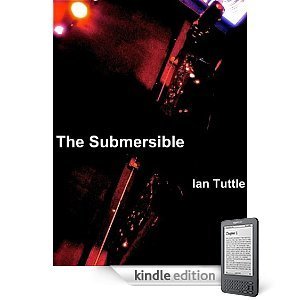Author interview: Ian Tuttle
I love short stories, but I find they often don't get the attention they deserve. Ian Tuttle has written one that is very successful, called The Submersible. In this interview he tells us more about his short story, but also his writing process and what lies ahead for him.
 Jerome: What can you tell us about The Submersible?
Jerome: What can you tell us about The Submersible?
Ian: The Submersible is a 1,300 word short story about a man all alone in a deep sea research vessel. He tries to maintain his relationship with his lover, Sasha, through the internet, but he loses her.
Jerome: Who are your readers?
Ian: Over 12,000 people read the story in one month when I posted it on Scribd.com last summer. I heard back from people of all ages from all over the world. At its heart, the story is about love, separation, and longing. These feelings resonate, I think, with everyone.
Jerome: What was your journey as a writer?
Ian: I always wanted to be a writer but I was terrified of trying it. I was worried I'd suck at it, that I'd be exposed as a fraud, that I'd try very hard and fail. Finally I told myself,

photo by Timothy Faust: http://www.tjfaust.com/
"You are going to suck at it at first. Just work hard and take advice and practice, practice, practice." It took me about six months of steady writing, about two hours a day, before I could separate my emotions (shame and embarrassment) from what I was producing. I submitted a story to a reading series called "Quiet Lightning," (http://qlightning.wordpress.com) and it was accepted. I had to stand up on stage and read it to strangers. It was terrifying, and so rewarding. It was a rite of passage.
I attend a weekly writing workshop, I set goals for myself, and I've involved myself in the local writer's community. The support and camaraderie of other writers has had a tremendously positive impact on my work and my personal development. Reading at public events, like Quiet Lightning, and at open mics, has also been an important positive influence. It's like product-testing with instant feedback. Scary, yes, but efficient!
Jerome: Do you follow a specific writing process?
Ian: When I'm writing, I have to turn off the internet, quit my email program, sometimes set a timer for twenty minutes and block out all distractions. I've kept word-count charts with weekly and monthly goals for my novel. I commit myself to events and contests so that I have deadlines. Also, I always carry a notebook, even if it's sometimes in the form of a cell phone.
Jerome: Where do you find inspiration?
Ian: If I experience a strong feeling or mood, I ask myself, "Where did that come from? What is the cause, and what will be the effect, of that feeling?" Stories, to me, are all about cause and effect. They're like big logic problems. A story is like a theorem. You have to set out the assumptions, the principles, then move your reader through the process, so that at the end they've arrived at an inevitable and irrefutable conclusion.
Jerome: Who are your favourite authors?
Ian: Gosh, whoever I'm reading right now. And whoever is actively writing right now. I love reading my friends' work. Then, of course, I've read Great Gatsby about twenty times, or more. I love William Gibson because he so efficiently conveys atmosphere. Virginia Woolf, John Steinbeck, James Salter, Hemingway, Pynchon, Nabokov. Authors who play with the medium, like Steven Hall in Raw Shark Texts, Palahniuk, Alex Garland.
Jerome: Is there a book you wish you had written? Which one?
Ian: A Sport and a Pastime, by James Salter.
Jerome: Do you have any tips for budding writers?
Ian: If you are writing, then you are a writer. Call yourself a writer. Tell other people you are a writer. Self-affirmation is a simple yet incredibly powerful tool.
Also, your job is to condense hours and hours of your own careful thinking into a reading experience that lasts a few minutes. Keep a hundred words for every thousand you write. Don't waste your reader's time.
Read your work to anyone who will listen, ask for their feedback, and when they give it, don't say a peep in response. If your reader "just doesn't get it," it's not their problem, it's yours.
Finally, if anyone hires you to write, take the job. You will learn so much about efficient communication by translating other people's thoughts into words, and their satisfaction will be the ultimate judge of your effectiveness.
Jerome: What are you working on at the moment?
Ian: Short fiction in real places, at http://stretchyhead.com. A collection of those Stretchyhead stories will be published Spring, 2011. I'm halfway through a novel. Also, a few short stories in the works.








Jerome Parisse's Blog
- Jerome Parisse's profile
- 25 followers



